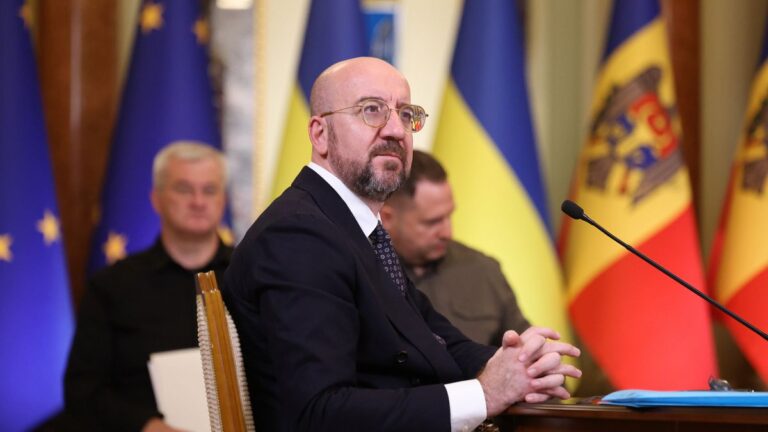The European Union must enlarge or risk the erection of a “new Iron Curtain” in the east, European Council President Charles Michel said on Monday, as the bloc marks 20 years since its biggest-ever enlargement.
advertisement
“Enlargement is crucial for the future of the EU. Without enlargement [there is] “The risk is a new Iron Curtain,” Michel said in an interview with selected journalists.
“It is extremely dangerous to have an unstable neighbourhood lacking prosperity and economic development. It is in the common interest of the candidate countries and the EU to move forward and accelerate,” he added.
His stern warning came on the anniversary of the so-called Big Bang expansion in 2004, when 10 countries, including seven former Soviet republics and satellite states, were admitted to the EU.
Without this historic enlargement, Michel said the EU would today be divided by a “de facto Iron Curtain” and warned that eastern countries would have become targets of “the Kremlin’s political and ideological attempts at occupation”.
Nine countries from Eastern Europe and the Western Balkans are currently waiting to become full members of the EU, a notoriously long and complicated process that requires candidate countries to meet strict EU demands, including major judicial and constitutional reforms.
Russia’s unprovoked aggression in Ukraine has given new momentum to the EU’s dormant enlargement policy, but attempts to speed up the accession process risk being blocked by skeptical member states.
Critics say long delays in integrating candidate countries have fuelled resentment towards Brussels.
Last December, Hungarian Prime Minister Viktor Orbán – whose government will hold the six-month presidency of the Council of the EU from July – threatened to use his veto to unilaterally block the start of accession negotiations with Ukraine.
But Michel denied speculation that Hungary’s presidency, combined with a polarised European Parliament following the elections, could further hinder the candidate country’s path to membership.
“I am convinced that the next institutional cycle will be an opportunity to reaffirm our common political will to expand,” Michel said.
Asked whether the Hungarian government might further obstruct Ukraine’s membership by removing the enlargement issue from the Security Council’s agenda, Michel said: “I’m not worried at all.”
“I feel confident because I feel that the leaders, the vast majority of them, are absolutely convinced that this is important for the future,” he also said.
Michel believes that so-called “constructive abstention” could be a safeguard for similar decisions in the future – a tactic used by Orban infamously last December when he walked out after leaders of 26 other countries approved the start of Ukraine’s EU accession talks.
“We used a constructive abstention, which gives a country the possibility to say: ‘I don’t like this decision, I’m not very happy with it, so I’m going to make my opinion public, but I don’t want to block the majority of member states.'”
Ukraine needs a “special transition”
Ukraine, a war-torn country with a per capita GDP one-third that of Bulgaria, the EU’s smallest economy, its possible EU membership has raised concerns that Kiev’s accession could destabilize the EU’s financial structure and turn many EU countries from net beneficiaries into net donors.
A recent report by the think tank Bruegel estimated the cost of the war-torn country’s EU membership at between 110 billion and 136 billion euros over seven years.
To mitigate the potential damage that Ukraine’s accession to the EU economy would cause, Michel said, the country needs a “special transition” based on a model that is not currently in the “system,” given the potential costs of post-war reconstruction.
Michel also said other countries more closely integrated into the EU economy could be admitted as EU members by the end of the century. He has previously said the EU must be prepared, including by implementing necessary reforms, to be ready for enlargement by 2030 at the latest.
advertisement
He called on the EU not to be “afraid” of Ukraine’s integration, arguing that as part of the single market the country would be an attractive investment destination.

